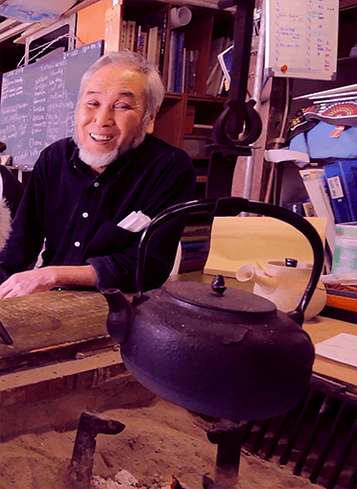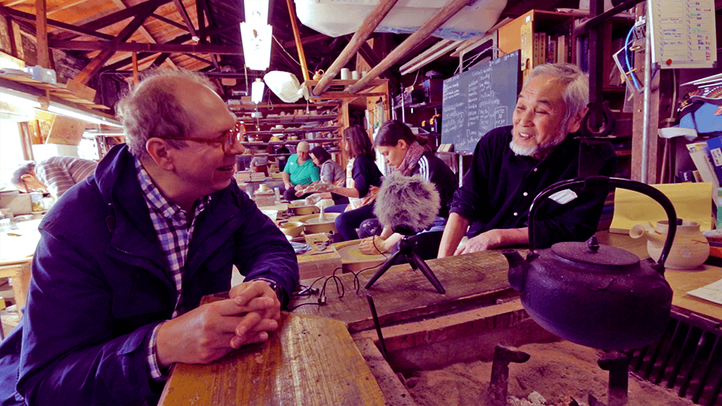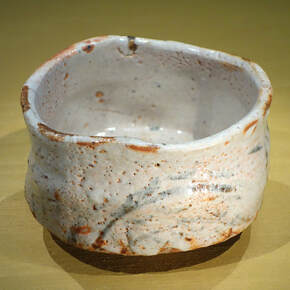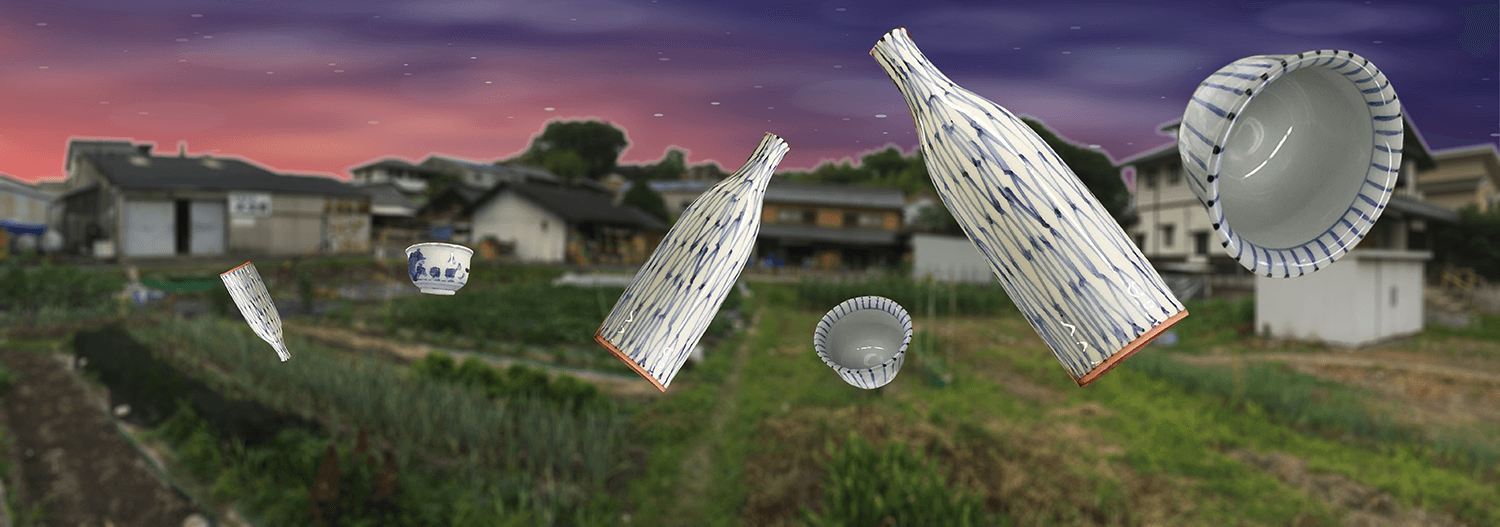Learn pottery in tajimi
The Ho-ca workshop
An interview with visiting students and their teacher, Shibata-sensei
By Hans O. Karlsson
We interviewed five visiting students from Australia, Hong Kong and Germany to learn about their experience.
a mixed bag of beginners and skilled students all having fun
One day in January 2019 we received a mail from a German girl by the name of Cara who wanted to know about pottery workshops in Tajimi. She had discovered this site and now wanted to visit our city for a few days with her sister and mother to learn pottery from a master. The group arrived in March and we visited them at the Ho-Ca, the studio we introduced to them. Not only did we find the three women happily throwing bowls in the old-style, rustic workshop, but also an Australian man who recognized me from the videos on this site. He too had found his way here after seeing one of our posts on a Facebook pottery group. By his side was a Taiwanese woman who also was spending a month in the workshop - both of these two students had considerable experience of pottery and had chosen to visit Tajimi to hone their skills. We interviewed all these people and they share their experience in the above video.
Slideshow of works by students at the Ho-Ca
We have updated this article after a visit to the new Ho-Ca gallery in Tajimi. At its opening in July 2019 they exhibited works by foreign students who took courses at the workshop over the last couple of years.
An interview with Shibata-sensei
Setsuro Shibata is very kind... has taught pottery for many years to foreign students at his workshop in Tajimi.
The producer of discovertajimi.com, Hans O. Karlsson, interviewed Shibata-sensei about his workshop and his teaching method.
Hans: All the students we talked to today seem to be very happy with your teaching style. You use unique methods as well, such as the blackboard to help with communications with the students.
Shibata-sensei: Yes, and it's all Tono-dialect! (laughs). The students love it!
H: You have a very free teaching style, don't you?
S: Every student is an individual with individual needs and wants. That's why I don't have a curriculum. Instead, I adapt the teaching to each of the students.
H: Most students spend quite a long time here, don't they? Although you have a group now that stays only five days.
S: Yes, that short stay group were lucky since there was an opening for three people to stay for a few days. I am glad you introduced them through us.
H: It sounds like they will be back.
S: Yes, they are really enjoying the workshop.
Shibata-sensei: Yes, and it's all Tono-dialect! (laughs). The students love it!
H: You have a very free teaching style, don't you?
S: Every student is an individual with individual needs and wants. That's why I don't have a curriculum. Instead, I adapt the teaching to each of the students.
H: Most students spend quite a long time here, don't they? Although you have a group now that stays only five days.
S: Yes, that short stay group were lucky since there was an opening for three people to stay for a few days. I am glad you introduced them through us.
H: It sounds like they will be back.
S: Yes, they are really enjoying the workshop.
H: I think they view this as a trial stay, but have made up their minds to come back again. Normally the course lasts one month, doesn't it?
S: Yes, that's right. The shortest people stay is normally twenty days.
H: What can you accomplish in that time span if you are a complete beginner?
S: You can actually reach quite a good level in one month. It's far better to concentrate for a month, doing nothing but pottery, than to practice once a week for thirty weeks. You need to learn the techniques not with your head but with your hands. Once you have done that, it's all a matter of your artistic talent. By taking an intensive course like this you can learn the technical side really fast.
H: You yourself are more of an artist than a craftsman, aren't you?
S: That's right. But I hide that side of me in the workshops (laughing). Well, anyway, I always stress that regular practice is the most important requirement for becoming a good potter. Two students that came here three years ago are attending the Tajimi City Pottery Design and Technical Center (Ishoken) from this year, and a Russian who studies here last year is enrolling at the school now in April.
H: If you access your booking page you seem to be fully booked all this year?
S: We are working on that. I hope we will be able to receive more students in the near future, so I encourage interested people to contact us.
H: One great convenience is that students can stay at the workshop, isn't it?
S: Yes, we are keen to provide good rooms that allow for privacy for our students.
H: Talking about the students, I get the impression from talking to the people here today that they are all very gentle, pleasant people.
S: Right, people who come to study here are good people without exception. Many are well educated, like medical doctors and others like that.
H: What about age?
S: Generally our youngest students are in their 30s and we have some up to 60 years old and more. We had one student who was 82. An american.
H: How about gender?
S: We have more female students than male. It's the same balance as for potters in Japan in general.
H: So to sum up your advice to people who would like to take this course is to book well in advance and plan for a month-long stay?
S: Absolutely. If you stay a month we have time to fire your pottery, so that you can enjoy the full experience.
H: And complete beginners are welcome?
S: That's right. We have no requirements regarding your skill level. I will make sure that you get off to a good start.
H: What are the most interesting things your students have produced so far?
S: There was a woman from Hong Kong who studied here three years ago. She had no previous experience of pottery but she made a number of quite wonderful pieces during her month here. She was so happy about her creations. One really fun creation was by a Russian student last year. He made a snake. It looked kind of friendly and fun (laughing). That's the guy that is enrolling in Ishoken now in April.
H: About the schedule, people practice from 10AM to 5PM every day?
S: Yes, seven days a week. If they want. They take a break for lunch and eat at their rooms.
H: This town is full of pottery galleries and museums, do they have time to see any of those?
S: We take them on a tour at least once or twice during their stay. For example, I took the three German students who are here now to the Ceramic Park and the Ichinokurasakazuki Museum here in Tajimi.
S: Yes, that's right. The shortest people stay is normally twenty days.
H: What can you accomplish in that time span if you are a complete beginner?
S: You can actually reach quite a good level in one month. It's far better to concentrate for a month, doing nothing but pottery, than to practice once a week for thirty weeks. You need to learn the techniques not with your head but with your hands. Once you have done that, it's all a matter of your artistic talent. By taking an intensive course like this you can learn the technical side really fast.
H: You yourself are more of an artist than a craftsman, aren't you?
S: That's right. But I hide that side of me in the workshops (laughing). Well, anyway, I always stress that regular practice is the most important requirement for becoming a good potter. Two students that came here three years ago are attending the Tajimi City Pottery Design and Technical Center (Ishoken) from this year, and a Russian who studies here last year is enrolling at the school now in April.
H: If you access your booking page you seem to be fully booked all this year?
S: We are working on that. I hope we will be able to receive more students in the near future, so I encourage interested people to contact us.
H: One great convenience is that students can stay at the workshop, isn't it?
S: Yes, we are keen to provide good rooms that allow for privacy for our students.
H: Talking about the students, I get the impression from talking to the people here today that they are all very gentle, pleasant people.
S: Right, people who come to study here are good people without exception. Many are well educated, like medical doctors and others like that.
H: What about age?
S: Generally our youngest students are in their 30s and we have some up to 60 years old and more. We had one student who was 82. An american.
H: How about gender?
S: We have more female students than male. It's the same balance as for potters in Japan in general.
H: So to sum up your advice to people who would like to take this course is to book well in advance and plan for a month-long stay?
S: Absolutely. If you stay a month we have time to fire your pottery, so that you can enjoy the full experience.
H: And complete beginners are welcome?
S: That's right. We have no requirements regarding your skill level. I will make sure that you get off to a good start.
H: What are the most interesting things your students have produced so far?
S: There was a woman from Hong Kong who studied here three years ago. She had no previous experience of pottery but she made a number of quite wonderful pieces during her month here. She was so happy about her creations. One really fun creation was by a Russian student last year. He made a snake. It looked kind of friendly and fun (laughing). That's the guy that is enrolling in Ishoken now in April.
H: About the schedule, people practice from 10AM to 5PM every day?
S: Yes, seven days a week. If they want. They take a break for lunch and eat at their rooms.
H: This town is full of pottery galleries and museums, do they have time to see any of those?
S: We take them on a tour at least once or twice during their stay. For example, I took the three German students who are here now to the Ceramic Park and the Ichinokurasakazuki Museum here in Tajimi.
About the workshop
Modern ceramist Setsuro Shibata will instruct you in this cozy environment. You can enjoy working at your own pace from one day experience to a full course. We recommend our courses for those who are interested in trying pottery freely, regardless of the form and color. We provide accommodation and it has proven popular not only among Japanese students, but also many visitors from overseas who come to spend time learning the craft of pottery. We provide guidance so that you can shop for food and visit pottery museums in the close vicinity of our studio.
learn more about pottery in tajimi
- Learn more about the Ho-Ca and other pottery workshops in Tajimi here.
- Learn more about Mino ware here.
- Take a tour of pottery museums in Tajimi here.
Bookings and inquiries
Please use this form to contact us about bookings and inquiries. Everyone welcome!



